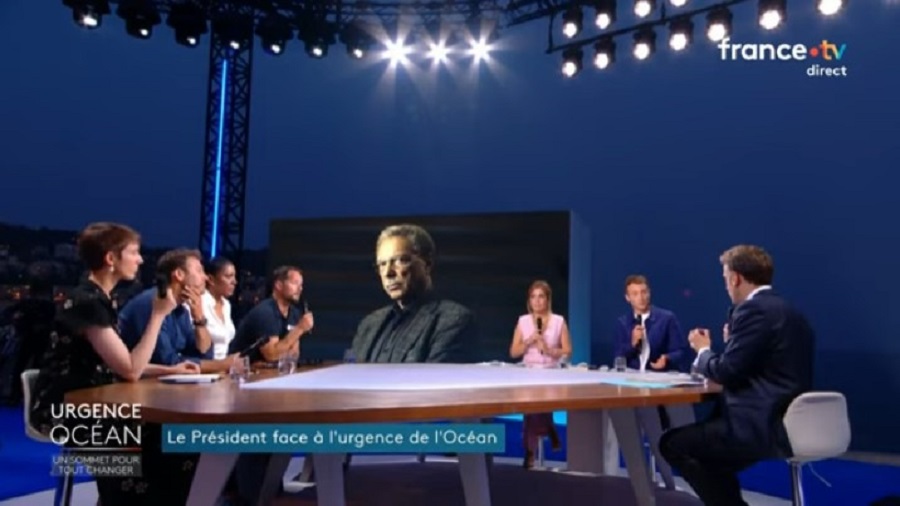During an interview with French national television, President Emmanuel Macron was confronted with images from David Attenborough’s Ocean documentary, which shows the gigantic nets of bottom trawlers operating in the Mediterranean dropping hundreds of tonnes of all kinds of fishes on a boat after razing the seafloor and everything in their way.
The interview was conducted live on June 10, 2025, in Nice, where the United Nations Ocean Conference (UNOC) was being held. In front of a small audience and a panel of environmental activists, Macron was asked by journalist Hugo Clément how is it possible that France still allows bottom trawling in Marine Protected Areas, when all the scientific evidence points to banning it, the European Commission strongly suggests to prohibit the practice in MPAs, Greece announced a ban on bottom trawling in all of its national marine parks and protected areas and the United Kingdom has plans to ban the practice in 41 of the country’s offshore marine protected areas.
Macron reacted by saying that the images in the film were not shot in France’s Exclusive Economic Zone and that his country was the one to launch, at the 2021 IUCN World Conservation Congress in Marseille, the movement to increase marine protected areas’ safeguards.
He noted that France has protected 33 per cent of its Exclusive Economic Zone, which includes its overseas territories such as French Polynesia, and that “strong protection” is currently at 4 per cent, moving to 14 per cent following the Nice summit.
However, Clément replicated saying that very similar boats to those in Attenborough’s documentary operate not only in France’s EEZ but also in its MPAs, where bottom trawling is restricted but not banned, and that as long as this is happening, it is kind of odd that France is claiming “strong protection” as an achievement.
The interviewer moved on to quote the Sea Around Us Principal Investigator, Dr. Daniel Pauly, who has warned, for decades, about the devastating effects of bottom trawling on marine ecosystems and how absurd it is to claim that an MPA is protected when massive, weighted nets bulldoze the ocean floor, destroying everything in their path.
Clément referenced words from a series of interviews Dr. Pauly gave to French media days before the UNOC, while he was conducting research at the Paris Institute for Advanced Studies on the immigration of Senegalese fishers to Europe due to the depletion of their country’s fisheries resources.
In particular, the journalist referred to a Q&A the Sea Around Us PI did with Libération.
“As for France, it is incredibly hypocritical on this subject,” Dr. Pauly told the newspaper, referring to the role of his country of birth when it comes to enforcing marine protection. “France has specialized in ‘paper parks,’ which are declared protected but are not in reality. I saw this myself in New Caledonia, where the entire exclusive economic zone (EEZ) was declared a marine protected area, even though fishing remained permitted there. It’s a mockery.”
Dr. Pauly explained that, at the international level, France is fighting against other countries’ initiatives aimed at clarifying the definition of a marine protected area and strengthening regulations.
“It’s sad because at the Nice summit this early June, Emmanuel Macron will surely present himself as an advocate and champion of the ocean. It will be a lie. What exactly do you expect from this summit? Nothing at all. They’ll talk, and Macron will put on a show, that’s all,” Dr. Pauly told Libération. He used similar words in subsequent interviews with Radio France, Reporterre, Oceanographic Magazine, Radio Canada, among others.
Low and behold, the 2025 United Nations Ocean Conference concluded with what Dr. Pauly dubs “a set of good intentions,” as 170 countries adopted the Nice Ocean Action Plan whose goals are to expand marine protected areas, decarbonize maritime transport, tackle marine pollution, especially plastics, and mobilize financing for vulnerable coastal and island nations.
In terms of progress on the treaty Biodiversity Beyond National Jurisdiction (BBNJ), also known as the High Seas Treaty, the Nice summit concluded with 49 countries having ratified it, just 11 short of the required 60 for it to come into effect. If approved, this legally binding instrument would regulate the conservation and sustainable use of marine biological diversity of areas beyond national jurisdiction.
When it comes to deep-sea mining, the 2025 UNOC saw four new countries joining forces with the 33 nations that had previously endorsed a moratorium on the extraction of minerals and metals from the seafloor. The initiative was led by France at a time when the US government is moving in the opposite direction.
Whether a moratorium on deep-sea mining will come into effect or not remains to be seen, as the International Seabed Authority is scheduled to meet in July 2025 to discuss the issue.
Another hot topic in Nice was that of plastics polluting the ocean, but no definitive action was achieved. Rather, some 90 ministers issued a symbolic statement reaffirming their support for the strongest possible plastics treaty, to be negotiated when talks resume in August.
“We need collective action, organized by a group that can exert pressure and intervene,” Dr. Pauly said, predicting that UNOC was going to lead to many promises and pledges but little binding regulations. “I’ve decided to keep fighting because I can’t do otherwise.”


